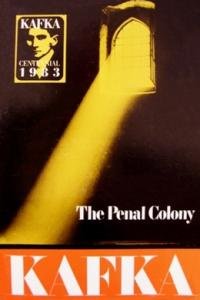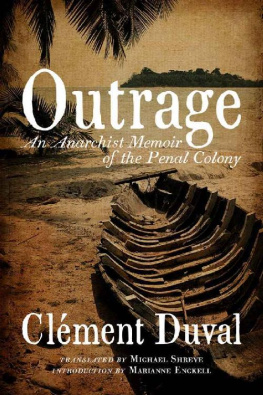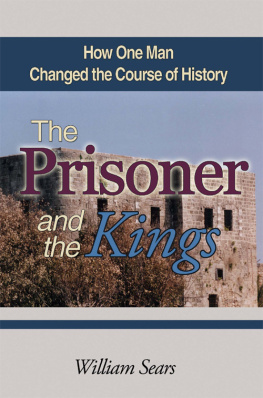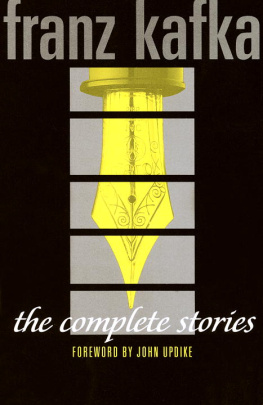In the Penal Colony
Franz Kafka
"It's a peculiar apparatus," said the Officer to the Traveler, gazing with a certain admiration at the device, with which he was, of course, thoroughly familiar. It appeared that the Traveler had responded to the invitation of the Commandant only out of politeness, when he had been invited to attend the execution of a soldier condemned for disobeying and insulting his superior. Of course, interest in the execution was not very high, not even in the penal colony itself. At least, here in the small, deep, sandy valley, closed in on all sides by barren slopes, apart from the Officer and the Traveler there were present only the Condemned, a vacantlooking man with a broad mouth and dilapidated hair and face, and the Soldier, who held the heavy chain to which were connected the small chains which bound the Condemned Man by his feet and wrist bones, as well as by his neck, and which were also linked to each other by connecting chains. The Condemned Man had an expression of such doglike resignation that it looked as if one could set him free to roam around the slopes and would only have to whistle at the start of the execution for him to return.
The Traveler had little interest in the apparatus and walked back and forth behind the Condemned Man, almost visibly indifferent, while the Officer took care of the final preparations. Sometimes he crawled under the apparatus, which was built deep into the earth, and sometimes he climbed up a ladder to inspect the upper parts. These were really jobs which could have been left to a mechanic, but the Officer carried them out with great enthusiasm, maybe because he was particularly fond of this apparatus or maybe because there was some other reason why one could not trust the work to anyone else. "It's all ready now!" he finally cried and climbed back down the ladder. He was unusually tired, breathing with his mouth wide open, and he had pushed two fine lady's handkerchiefs under the collar of his uniform.
"These uniforms are really too heavy for the tropics," the Traveler said, instead of asking some questions about the apparatus, as the Officer had expected. "That's true," said the Officer. He washed the oil and grease from his dirty hands in a bucket of water standing ready, "but they mean home, and we don't want to lose our homeland." "Now, have a look at this apparatus," he added immediately, drying his hands with a towel and pointing to the device. "Up to this point I had to do some work by hand, but from now on the apparatus should work entirely on its own." The Traveler nodded and followed the Officer. The latter tried to protect himself against all eventualities by saying, "Of course, breakdowns do happen. I really hope none will occur today, but we must be prepared for it. The apparatus is supposed to keep going for twelve hours without interruption. But if any breakdowns do occur, they'll only be very minor, and we'll deal with them right away."
"Don't you want to sit down?" he asked finally, as he pulled out a chair from a pile of cane chairs and offered it to the Traveler. The latter could not refuse. He sat on the edge of the pit, into which he cast a fleeting glance. It was not very deep. On one side of the hole the piled earth was heaped up into a wall; on the other side stood the apparatus. "I don't know," the officer said, "whether the Commandant has already explained the apparatus to you." The Traveler made an vague gesture with his hand. That was good enough for the Officer, for now he could explain the apparatus himself.
"This apparatus," he said, grasping a connecting rod and leaning against it, "is our previous Commandant's invention. I also worked with him on the very first tests and took part in all the work right up to its completion. However, the credit for the invention belongs to him alone. Have you heard of our previous Commandant? No? Well, I'm not claiming too much when I say that the organization of the entire penal colony is his work. We, his friends, already knew at the time of his death that the administration of the colony was so selfcontained that even if his successor had a thousand new plans in mind, he would not be able to alter anything of the old plan, at least not for several years. And our prediction has held. The New Commandant has had to recognize that. It's a shame that you didn't know the previous Commandant!"
"However," the Officer said, interrupting himself, "I'm chattering, and his apparatus stands here in front of us. As you see, it consists of three parts. With the passage of time certain popular names have been developed for each of these parts. The one underneath is called the bed, the upper one is called the inscriber, and here in the middle, this moving part is called the harrow." "The harrow?" the Traveler asked. He had not been listening with full attention. The sun was excessively strong, trapped in the shadowless valley, and one could hardly collect one's thoughts. So the Officer appeared to him all the more admirable in his tight tunic weighed down with epaulettes and festooned with braid, ready to go on parade, as he explained the matter so eagerly and, while he was talking, adjusted screws here and there with a screwdriver.
The Soldier appeared to be in a state similar to the Traveler. He had wound the Condemned Man's chain around both his wrists and was supporting himself with his hand on his weapon, letting his head hang backward, not bothering about anything. The Traveler was not surprised at that, for the Officer spoke French, and clearly neither the Soldier nor the Condemned Man understood the language. So it was all the more striking that the Condemned Man, in spite of that, did what he could to follow the Officer's explanation. With a sort of sleepy persistence he kept directing his gaze to the place where the Officer had just pointed, and when the question from the Traveler interrupted the Officer, the Condemned Man looked at the Traveler, too, just as the Officer was doing.
"Yes, the harrow," said the Officer. "The name fits. The needles are arranged as in a harrow, and the whole thing is driven like a harrow, although it stays in one place and is, in principle, much more artistic. You'll understand in a moment. The condemned is laid out here on the bed. First, I'll describe the apparatus and only then let the procedure go to work. That way you'll be able to follow it better. Also a sprocket in the inscriber is excessively worn. It really squeaks. When it's in motion one can hardly make oneself understood. Unfortunately replacement parts are difficult to come by in this place. So, here is the bed, as I said. The whole thing is completely covered with a layer of cotton wool, the purpose of which you'll find out in a moment. The condemned man is laid out on his stomach on the cotton woolnaked, of course. There are straps for the hands here, for the feet here, and for the throat here, to tie him in securely. At the head of the bed here, where the man, as I have mentioned, first lies face down, is this small protruding lump of felt, which can easily be adjusted so that it presses right into the man's mouth. Its purpose is to prevent him screaming and biting his tongue to pieces. Of course, the man has to let the felt in his mouthotherwise the straps around his throat would break his neck." "That's cotton wool?" asked the Traveler and bent down. "Yes, it is," said the Officer smiling, "feel it for yourself."
He took the Traveler's hand and led him over to the bed. "It's a specially prepared cotton wool. That's why it looks so unrecognizable. I'll get around to mentioning its purpose in a moment." The Traveler was already being won over a little to the apparatus. With his hand over his eyes to protect them from the sun, he looked at the apparatus in the hole. It was a massive construction. The bed and the inscriber were the same size and looked like two dark chests. The inscriber was set about two metres above the bed, and the two were joined together at the corners by four brass rods, which almost reflected the sun. The harrow hung between the chests on a band of steel.











